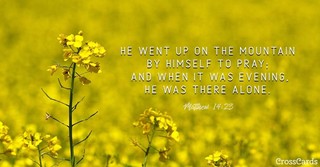- Recent Translations
- All Translations
Matthew 14:15
Share
Settings
Matthew 14:15 in Other Translations
Matthew 14:15 Meaning and Commentary
And when it was evening
Mark says, "when the day was now far spent"; and Luke, "when the day began to wear away"; it was upon the decline of the day. The Jews, as Grotius rightly observes, had two evenings; the one began when the sun declined at noon, and the other at sun setting: now it was the former of these, and not the latter, that was now come; for after this, you read of another evening that was come, ( Matthew 14:23 ) between which two evenings Christ made the multitude to sit down, and he fed them in a miraculous manner; and the disciples reason for the dismission of the multitude, that might go into the neighbouring villages, and buy provisions, shows that it could not be the last, but the first of these evenings, that is here meant.
His disciples came to him;
the twelve, whom he had left in that part of the desert he retired to; or on the mount, where he had sat down with them for their rest and refreshment:
saying, this is a desert place;
where no food was to be had; where were no houses of entertainment:
and the time is now past;
not the time of the day, but of dining: the usual dinner time was past, which, with the Jews, was the fifth hour of the day, and answers to eleven o'clock with us, or at furthest six; which, with us, is twelve at noon; concerning which, the Jewish doctors thus dispute F6.
``The first hour, is the time of eating for the Lydians, or Cannibals; the second for thieves, the third for heirs, the fourth for workmen, and the fifth for every man: but does not R. Papa say, that the fourth is the time of dining for every man? But if so, if the fourth is the time for every man, the fifth is for workmen, and the sixth for the disciples of the wise men.''Which is elsewhere F7 delivered with some little variation, thus;
``the first hour is the time of eating for Lydians; the second, for thieves; the third, for heirs; the fourth, for workmen; the fifth, for scholars; and the sixth, for every man: but does not R. Papa say''But supposing the usual time of dining to be, at the furthest, at the sixth hour, at twelve o'clock, this time must be elapsed, since the first evening was commenced; so that the reasoning of the disciples is very just,
send the multitude away.
Christ was preaching to them, the disciples move that he would break off his discourse, and dismiss them; in the synagogue the manner of dismissing the people was, by reading the (hrjph) , or "dismission", which was some passage out of the prophetic writings.
That they may go into the villages and buy themselves victuals;
the little towns which lay nearest the desert, where they might be supplied with suitable provisions.
F6 T. Bab. Sabbat. fol. 11. 1.
F7 T. Bab. Pesachim, fol. 12. 2.
